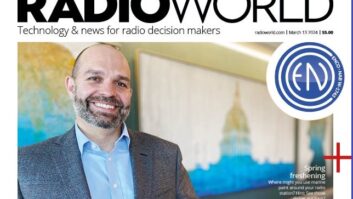
Books by iStockphoto/Rafa Irusta
Just before 2009 ran out of gas, the Media Bureau’s Audio Division issued an order that raised a number of eyebrows.
It emerged from an unusual set of facts and thus might not ordinarily have attracted much attention since its precedential effect probably is pretty limited. But the division’s approach here was remarkable, so the team at Cole’s Law Central figured a recap would be in order.
The case involves WCJL(FM), a noncommercial station in Morgantown, Ind. — or maybe not really Morgantown, as it turns out.
While the original CP application, filed with the Federal Communications Commission in 1998, specified Morgantown as the community of license, that was at a time when the rules imposed no coverage requirements at all for NCE stations. That is, even though the applicant specified Morgantown, the applicant was not then required to demonstrate that it would provide any actual signal to Morgantown.
And that was the start of the problem.
Rule change
The application turned out to be mutually exclusive with a number of others, as usually happens in the world of NCE-FM CP applications. Things got worked out through a settlement and in 2002 the application was granted.
But by that time the FCC had changed its city-grade coverage rules for NCE-FM stations.
The new rules (currently still in effect) require that an NCE-FM station cover at least 50 percent of its city of license with a 60 dBu signal. What’s more, when the coverage rule was changed, the commission decided that it should be applied to all applications then in the pipeline, even if they had been filed before the new rule kicked in. So theoretically WCJL should have been required to cover at least half of Morgantown with a 60 dBu signal.
But as it turned out, the coverage rule had been waived in order to get the settlement approved, so it appears that WCJL was under no obligation to provide any particular signal to any portion of Morgantown.
Fast-forward to 2009. WCJL asked the commission to change its city of license from Morgantown to Paragon, Ind. WCJL pointed out that Paragon has no local broadcast station, so the FCC should be liking the proposal. The FCC countered, noting that WCJL is the only station licensed to Morgantown, and longstanding commission policy makes it particularly difficult to justify removing a community’s only station.
At that point, WCJL brought out what it presumably thought was a killer argument.
According to the station, it does not now provide and has never provided any service to Morgantown at all, so it shouldn’t make any difference to Morgantown if WCJL were to be assigned to a different community. Its transmitter site is 23 miles away from Morgantown, for crying out loud, and contour protection considerations prevent it from moving any closer. So basically, any notion that the station currently serves Morgantown — and, therefore, that Morgantown would suffer any loss if the station were to be re-assigned to Paragon — is totally illusory.
Not bad; but the Audio Division was having none of it.
‘Local service’
FCC staff engineers dug into the files and concluded that “WCJL covers 50 percent of Morgantown with a signal strength of at least 54 dBu. As such, we consider station WCJL as providing a local service to Morgantown.”
Normally, such statements are accompanied by a citation to maybe a rule, or at least a policy statement or other published precedent.
But the division’s assertion is naked in that respect, which suggests that its claim that “local service” is established by 54 dBu coverage of half the town is — how can we say this delicately — somewhat lacking in legitimacy.
The division didn’t stop there, however.
Perhaps in an effort to scare WCJL away from trying to question the “54 dBu = local” claim, the Audio Division dropped a footnote shaking its bureaucratic finger at WCJL and claiming that the station has an “issue-responsive service obligation to provide programming responsive to its community of license and that its programming record will be a relevant factor” come renewal time. Oooh, snap. The division was doing its best to turn WCJL’s argument back against the station: By suggesting that the station’s argument would threaten the station’s renewal, the division obviously was trying to discourage WCJL from pressing that argument too far.
(The division even suggested that it had thought about referring the lack of local programming to the FCC Enforcement Bureau. That’s kind of like your mother threatening to tell your father of your misbehavior when he gets home, or the principal of your school telling you that whatever you did is going to go on your Permanent Record. Usually, those are empty threats, as apparently was the case here; the division ultimately declined to bring the enforcement folks into the WCJL matter.)
‘Issue-responsive’
But hold on a minute. When the division referred to some “issue-responsive service obligation,” again it cited no rule where that obligation has been set out.
That’s probably because there is no such rule — and, at least in the considered opinion of the Localism and Other Urban Myths Desk here at Team Cole’s Law, there is no such obligation. (Now is not the time for an extended explanation, but you can find a discussion of “localism” that our firm Fletcher, Heald & Hildreth presented to the FCC in its localism proceeding. The presentation can be read here [PDF].
So the division’s letter was based on two non-existent rules. To be sure, the commission’s staff might prefer to have such rules in place; but wishing that they were there and actually having them in the rule book are obviously two different things.
Whether any further review of the division’s action will be sought remains to be seen. It is possible that some middle ground exists that might permit the station to get essentially what it wants without forcing the division to admit that its action was based more on bluff than on any enforceable commission authority. That should certainly make both the FCC and WCJL happy.
As for the rest of us, we’ll just have to live with the knowledge that everything the FCC says in its decisions may not be precisely as well-established as the commission is letting on.
Harry F. Cole is a member of the law firm of Fletcher, Heald & Hildreth in Arlington, Va., and a long-time contributor to Radio World. Opinions are his own.












